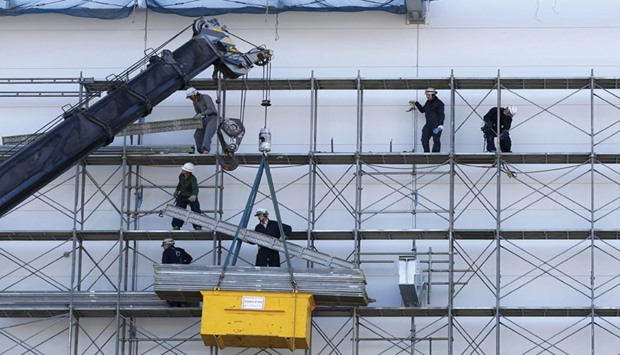The 14.4% fall in core orders, a highly volatile data series regarded as a leading indicator of capital spending in the coming six to nine months, fell short of economists’ median estimate for a 7.9% month-on-month drop, Cabinet Office data showed yesterday.
The data comes as the economy got the new year off to a rough start as China’s slowing growth and tumbling oil prices rattled global markets, raising fears of deepening slowdown in the world economy and potentially eroding confidence at Japanese firms.
Uncertainty over the outlook could lead Japanese firms to further delay implementing their spending plans, further diminishing policymakers’ hopes of generating a virtuous growth cycle of higher incomes and investment by the private sector.
Prime Minister Shinzo Abe has heaped pressure on companies to raise wages and boost spending, but many firms are resisting and labour unions have been cautious when demanding pay rises, a further sign of trouble for Abe’s campaign to spur growth.
“It’s becoming harder for virtuous growth to materialise,” said Hiroshi Shiraishi, senior economist at BNP Paribas Securities.
Slowdown in emerging economies that had led the global recovery from the last financial crisis, and the ongoing collapse in commodity prices, are dampening Japanese firms’ growth expectations and curbing inflation, Shiraishi said.
Against this backdrop, even the union at Toyota Motor Corp is set to lower its pay demands versus last year’s at the annual “shunto” spring wage negotiations, underscoring the degree of difficulty in getting wage growth to accelerate, he added.
Yesterday’s data showed machinery orders from manufacturers fell 10.2% in November, the biggest decline since June 2015, and those from non-manufacturers dropped a record 18%, after items such as railway cars boosted orders in the previous month. Orders from abroad also fell 25%. The Bank of Japan’s key tankan survey in December showed big firms planned to boost capital spending by 10.8% this fiscal year to March, but companies have so far been slow to implement their spending plans because of uncertainty over the outlook.
Japan’s economy narrowly dodged a recession in the third-quarter of 2015. It is expected to continue moderate growth in the last quarter, but some economists flagged the risk of a contraction due to weak consumption and slack capital spending.

